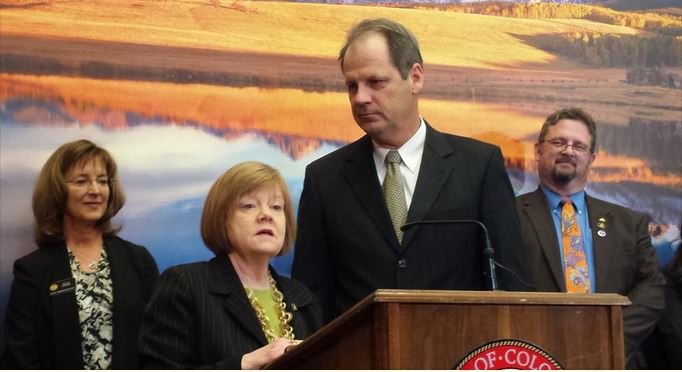Colorado House Speaker Dickey Lee Hullinghorst is wasting no time in advancing her efforts to turn the hospital provider fee into an enterprise fund — announcing Tuesday that she will introduce a bill to make that move.
The new bill comes just one day after the state’s attorney general said she considers such a maneuver to be legal and constitutional.
Colorado House Speaker Dickey Lee Hullinghorst and Senate President Bill Cadman speak together in times of more agreement — at the official bill-signing for the 2015-16 state budget.
Colorado House Speaker Dickey Lee Hullinghorst and Senate President Bill Cadman speak… more
Ed Sealover | Denver Business Journal
But while Hullinghorst may have a legal opinion on her side from Republican AG Cynthia Coffman, she remains no where close to agreement with the top Republicans in the Legislature, Senate President Bill Cadman. Cadman, R-Colorado Springs, went as far as to say Tuesday that any bill from the Gunbarrel Democrat is dead on arrival if it, like her failed 2015 effort on the subject, it does not reset the Taxpayer’s Bill of Rights revenue cap by pulling the current provider-fee revenues out of the calculations and lowering that cap in future years.
The opposing reactions continue the pattern of the past two months, in which supporters of turning the seven-year-old fee into an enterprise fund — and thus freeing up more money in the budget for transportation and education — believe they have found an opening through which they can move forward, only to be reminded by Cadman that the majority caucus in the Senate feels the proposals to unconstitutional or at least unwise.
The fee, charged to hospitals for each night they keep a patient in a bed, generates more than $1 billion in combined state and federal funds to increase Medicaid rolls in this state, but it also is expected next fiscal year to push the state over the TABOR revenue cap and require the state to refund tax money to residents.
Hullinghorst’s decision to move forward with a bill, even without agreement, is likely to bring the issue to a head after some 10 months of negotiations, however. She said she plans to introduced the bill in enough time to bring it to a House vote before the 2016-17 budget bill is introduced on March 28, giving the Joint Budget Committee enough time to rewrite the budget if members feel that enterprising the fee is doable.
“It is time for us to address the problem on behalf of the people of Colorado,” Hullinghorst said. “This was my hope that if we could get past the constitutional issues — and I think the attorney general did a fine job of doing that — we’d be able to get down to some of the conversations we were having before the whole constitutional issue came up. But that hasn’t happened in the past month.”
The issue of constitutionality arose after the nonpartisan Office of Legislative Legal Services responded to a query from Cadman on Dec. 31 by saying that the Legislature could not turn the fee into an enterprise fund and pull it out from under the TABOR cap. Doing so would require the fee to function like a state-owned business, and the state was not offering any business-like services to the hospitals in return for the fee, OLLS said.
Coffman, however, came to a different conclusion. Because the fee lacks the power to tax, is financially distinct from its parent agency and does offer government services — the ability to expand Medicaid eligibility — it can be an enterprise, she wrote.
Cadman, however, said that regardless of that conclusion, he still finds one portion of Hullinghorst’s 2015 provider-fee bill to be unconstitutional. That portion states specifically that removing the provider-fee revenues from the overall base of tax revenues that determine when the state has exceeded the TABOR cap will not reduce the base on which the cap is determined — a derivation from past efforts to take money out of the general fund and put it into an enterprise fund.
“There’s a huge component in there that doesn’t comply with the constitution,” he said. “If the bill’s exactly the same, it doesn’t pass constitutional muster.”
Hullinghorst disagreed, saying that the specific mechanisms she proposed in the 2015 bill — and plans to propose again — are fully legal. Those mechanisms essentially turn off the provider fee as a source of general-fund money and re-create it as a stand-alone enterprise fund, eliminating the need to make any statement on the TABOR cap, she said.
Even as Cadman appeared to shut the door once again on the possibility of passing such a bill, however, Hullinghorst chose to take a bit of hope in his statement.
“What I’m really encouraged about is there are things he wants to talk about regarding how we introduce the hospital provider-fee bill,” she said. “I’m encouraged that, OK, that might not be the answer but there certainly is a starting point. And I’m encouraged to work with him about that.”
Ed Sealover covers government, health care, tourism, airlines, hospitality and restaurants for the Denver Business Journal and writes for the “Capitol Business” blog. Phone: 303-803-9229.

Leave a Reply